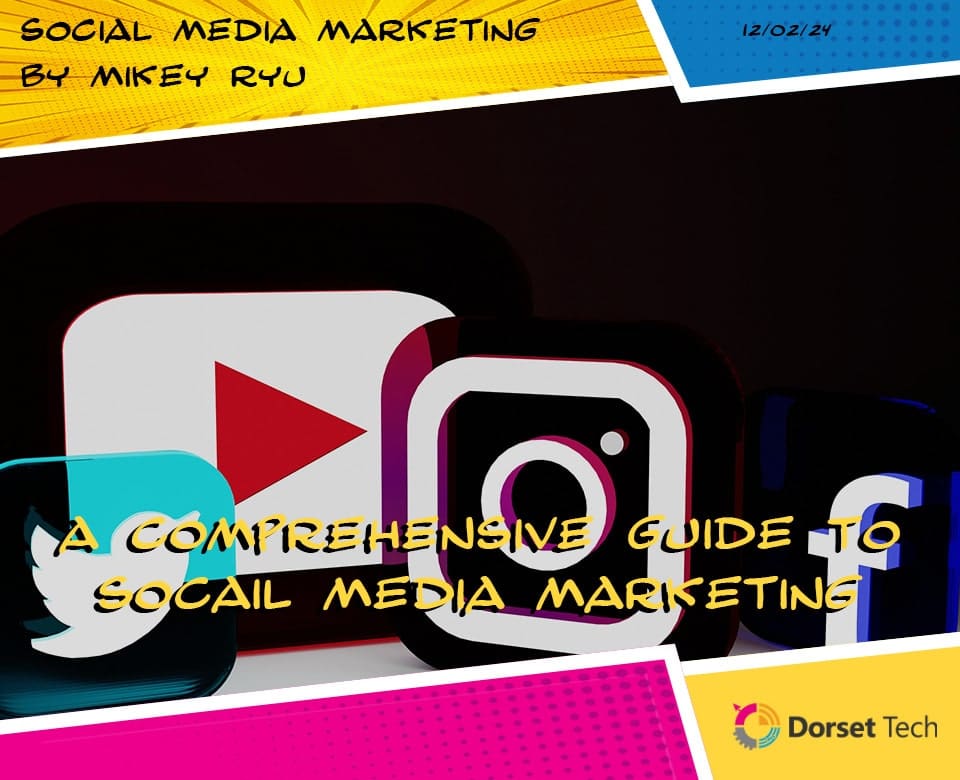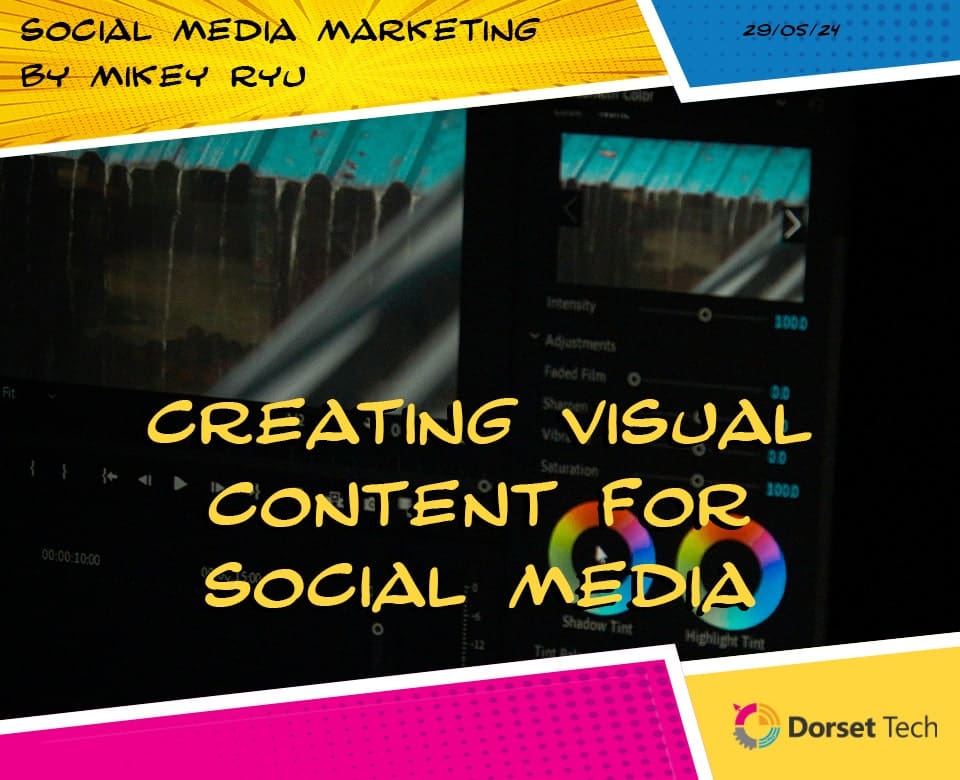
A Comprehensive Guide to Social Media Marketing in 2024
What is Social Media Marketing?
Social media marketing refers to the process of utilising social media platforms to engage with audiences, build brand awareness, drive website traffic, and ultimately increase sales or achieve other marketing goals. It involves creating and sharing content on various social media channels, analysing engagement metrics, and refining strategies to optimise results.
Why Use Social Media Marketing For Your Business?
In today’s digitally-driven world, social media has transformed the way businesses connect with their target audience and promote their products or services. With billions of active users across various platforms, social media marketing has emerged as a cornerstone of modern marketing strategies. But why exactly should businesses invest time and resources into social media marketing? Let’s delve into the compelling reasons.
1. Reach a Vast Audience:
Social media platforms boast staggering user bases, making them invaluable channels for reaching a diverse and extensive audience. Whether your target demographic is teenagers, young professionals, or retirees, chances are they’re active on platforms like Facebook, Instagram, Twitter, LinkedIn, and others. Leveraging social media allows businesses to expand their reach beyond geographical boundaries and tap into global markets.
2. Build Brand Awareness:
Establishing a strong brand presence is crucial for staying top-of-mind among consumers. Social media provides businesses with an unparalleled opportunity to showcase their brand identity, values, and offerings to a wide audience. By consistently sharing engaging content and interacting with followers, businesses can cultivate brand recognition and foster a loyal community of customers and advocates.
3. Drive Website Traffic:
Social media serves as a gateway to your website, enabling businesses to drive traffic and funnel visitors to their online platforms. Whether you’re promoting blog posts, product pages, or special offers, strategically placed links on social media posts can direct interested users to explore your website further. This increased traffic not only boosts your online visibility but also enhances opportunities for lead generation and conversions.
4. Engage with Your Audience:
Unlike traditional advertising channels, social media facilitates two-way communication between businesses and their audience. Through likes, comments, shares, and direct messages, businesses can engage in meaningful conversations with customers, address inquiries, gather feedback, and provide personalized assistance. This active engagement humanizes your brand and fosters genuine connections, leading to increased customer loyalty and advocacy.
5. Gain Valuable Insights:
Social media platforms offer robust analytics tools that provide businesses with invaluable insights into their audience’s preferences, behaviors, and demographics. By analyzing engagement metrics, demographics, and content performance, businesses can fine-tune their social media strategies, optimize content for better results, and make data-driven decisions. These insights not only inform your social media efforts but also contribute to overall marketing and business strategies.
6. Cost-Effective Marketing:
Compared to traditional advertising channels like television or print media, social media marketing often offers a more cost-effective solution for businesses, especially those with limited marketing budgets. Many social media platforms provide advertising options that allow businesses to target specific demographics, interests, and behaviors, ensuring that marketing efforts are directed towards the most relevant audience segments. Additionally, organic content creation and engagement on social media require minimal financial investment, making it accessible to businesses of all sizes.
In essence, social media marketing presents businesses with a plethora of opportunities to expand their reach, engage with their audience, and achieve their marketing objectives in a dynamic and competitive landscape. By embracing social media as a core component of their marketing strategy, businesses can stay ahead of the curve, foster meaningful connections with their audience, and drive sustainable growth in the digital age.
Key Components of Social Media Marketing:
In the ever-evolving realm of digital marketing, social media stands out as a dynamic and influential platform for businesses to connect with their audience, build brand awareness, and drive engagement. However, effective social media marketing entails more than just posting occasional updates or sharing random content. It requires a strategic approach encompassing various key components. Let’s explore these essential elements that form the backbone of successful social media marketing campaigns.
1. Content Strategy:
At the heart of social media marketing lies content strategy. Creating high-quality, relevant, and engaging content is crucial for capturing the attention of your target audience and encouraging interaction. Your content should align with your brand identity, address the interests and pain points of your audience, and offer value. From informative articles and captivating visuals to entertaining videos and interactive polls, diverse content formats can cater to different audience preferences and keep them coming back for more.
2. Audience Research and Targeting:
Understanding your audience is paramount for crafting tailored social media campaigns that resonate with your target demographic. Conducting thorough audience research helps identify their demographics, interests, behaviours, and pain points. Armed with these insights, businesses can create content that speaks directly to their audience’s needs and preferences. Additionally, social media platforms offer advanced targeting options, allowing businesses to reach specific audience segments based on factors like age, location, interests, and online behaviour.
3. Community Engagement:
Social media is inherently social, and fostering genuine interactions with your audience is essential for building a loyal community around your brand. Actively engage with your followers by responding to comments, addressing queries, and initiating conversations. Encourage user-generated content by featuring customer testimonials, reviews, and user-submitted photos or videos. By nurturing a sense of community, businesses can cultivate brand advocates who not only promote their products or services but also contribute to a positive brand image.
4. Consistent Brand Identity:
Maintaining a consistent brand identity across all social media channels is crucial for reinforcing brand recognition and trust. From your profile imagery and tone of voice to your messaging and visual aesthetics, ensure coherence in how your brand presents itself online. Consistency fosters familiarity and strengthens your brand’s positioning in the minds of your audience. Whether it’s a playful and lighthearted tone or a professional and informative approach, stay true to your brand’s personality across every interaction.
5. Data Analysis and Optimisation:
Data-driven decision-making is a cornerstone of effective social media marketing. Leverage analytics tools provided by social media platforms to track key metrics such as engagement, reach, click-through rates, and conversions. Analyse these metrics to gain insights into what content performs best, which audience segments are most responsive, and what strategies yield the highest ROI. Use this data to refine your social media strategy, optimize content, and allocate resources effectively for maximum impact.
6. Paid Advertising:
While organic reach on social media is valuable, paid advertising can amplify your brand’s visibility and reach a broader audience. Social media platforms offer a variety of advertising options, including sponsored posts, display ads, and promoted content. These advertising solutions allow businesses to target specific demographics, interests, and behaviours, ensuring that their messages reach the most relevant audience segments. Incorporating paid advertising into your social media marketing strategy can complement organic efforts and drive measurable results.
In conclusion, successful social media marketing requires a strategic approach that encompasses content strategy, audience research, community engagement, brand consistency, data analysis, and paid advertising. By focusing on these key components and continuously adapting to evolving trends and consumer preferences, businesses can harness the power of social media to effectively engage their audience, build brand loyalty, and drive business growth.
Benefits of Social Media Marketing:
Social media has transformed the way businesses interact with their audience and market their products or services. From increased brand awareness to improved customer engagement, social media marketing offers a plethora of benefits that can propel businesses towards success in the digital age. Let’s explore some of the key advantages of leveraging social media for marketing purposes.
1. Enhanced Brand Awareness:
Social media provides businesses with a powerful platform to showcase their brand identity and reach a vast audience. By consistently sharing engaging content and interacting with followers, businesses can increase their visibility and foster brand recognition. With billions of active users across various platforms, social media offers unparalleled opportunities to expand brand awareness both locally and globally.
2. Improved Customer Engagement:
One of the most significant advantages of social media marketing is the ability to directly engage with customers in real-time. Through likes, comments, shares, and direct messages, businesses can initiate conversations, address customer inquiries, and gather valuable feedback. This active engagement fosters stronger relationships with customers, enhances brand loyalty, and encourages advocacy.
3. Cost-Effective Marketing:
Compared to traditional advertising channels, social media marketing often offers a more cost-effective solution for businesses, especially those with limited marketing budgets. Many social media platforms provide free tools and analytics that enable businesses to create and share content organically without significant financial investment. Additionally, paid advertising options on social media allow businesses to target specific demographics, ensuring that marketing efforts are directed towards the most relevant audience segments.
4. Targeted Advertising:
Social media platforms offer robust advertising solutions that allow businesses to target specific demographics, interests, and behaviours with precision. Whether it’s age, location, interests, or online behaviour, businesses can tailor their advertisements to reach the most relevant audience segments. This targeted approach increases the efficiency of marketing campaigns and maximizes the return on investment (ROI) by ensuring that messages resonate with the right audience.
5. Valuable Insights and Analytics:
Social media platforms provide businesses with comprehensive analytics tools that offer valuable insights into audience demographics, engagement metrics, and content performance. By analyzing these metrics, businesses can gain a deeper understanding of their audience’s preferences, behaviours, and sentiments. This data-driven approach enables businesses to refine their social media strategies, optimize content for better results, and make informed decisions that drive business growth.
6. Increased Website Traffic and Conversions:
Social media serves as a powerful driver of website traffic, with businesses leveraging platforms to funnel visitors to their online platforms. By strategically sharing links to blog posts, product pages, or special offers, businesses can encourage followers to explore their websites further. This increased traffic not only boosts online visibility but also enhances opportunities for lead generation, conversions, and sales.
In summary, social media marketing offers businesses a multitude of benefits, including enhanced brand awareness, improved customer engagement, cost-effective marketing, targeted advertising, valuable insights, and increased website traffic and conversions. By harnessing the power of social media effectively, businesses can strengthen their online presence, connect with their audience on a deeper level, and achieve their marketing objectives in today’s digital landscape.
Best Practices of Social Media Marketing:
Navigating the dynamic landscape of social media marketing requires businesses to adopt strategic approaches and adhere to best practices to maximize their impact and achieve their marketing objectives. Here are some key best practices to consider when leveraging social media for marketing purposes:
1. Define Clear Goals and Objectives:
Before diving into social media marketing, it’s essential to define clear and measurable goals that align with your overall business objectives. Whether it’s increasing brand awareness, driving website traffic, generating leads, or boosting sales, setting specific, achievable, and time-bound goals provides direction and helps track progress effectively.
2. Know Your Audience:
Understanding your target audience is fundamental to crafting content and messaging that resonates with them. Conduct thorough audience research to identify demographics, interests, behaviours, and pain points. Tailor your content and communication style to address their needs and preferences, fostering stronger connections and engagement.
3. Create Compelling Content:
Quality content lies at the heart of successful social media marketing. Strive to create content that is relevant, informative, entertaining, and visually appealing. Experiment with various formats, such as videos, images, infographics, and polls, to keep your audience engaged and interested. Maintain a consistent posting schedule to stay top-of-mind and maintain audience engagement.
4. Foster Engagement and Conversations:
Social media is inherently interactive, offering opportunities for meaningful engagement with your audience. Encourage conversations by asking questions, soliciting feedback, and responding promptly to comments and messages. Actively engage with your audience to build relationships, demonstrate authenticity, and foster a sense of community around your brand.
5. Be Authentic and Transparent:
Authenticity and transparency are crucial for building trust and credibility on social media. Be genuine in your interactions, share behind-the-scenes glimpses of your business, and showcase real customer stories and testimonials. Transparency in communication, especially during crises or challenging situations, helps maintain credibility and loyalty among your audience.
6. Utilise Visual Storytelling:
Visual content tends to resonate more strongly with audiences than text alone. Incorporate visual storytelling elements such as images, videos, and graphics to convey your brand’s message effectively. Ensure that your visual content is high-quality, on-brand, and optimised for each social media platform’s specifications.
7. Monitor and Analyse Performance:
Regularly monitor and analyze key metrics to evaluate the effectiveness of your social media efforts. Track metrics such as reach, engagement, click-through rates, conversions, and sentiment to gain insights into what content resonates with your audience and what strategies yield the best results. Use these insights to refine your approach, optimize content, and allocate resources effectively.
8. Stay Updated with Trends and Algorithm Changes:
Social media platforms are constantly evolving, with algorithm changes, new features, and emerging trends shaping user behaviour and content consumption patterns. Stay abreast of these developments by actively following industry news, participating in relevant communities, and adapting your strategies accordingly. Embrace innovation and experimentation to stay ahead of the curve and maintain a competitive edge.
By incorporating these best practices into your social media marketing strategy, you can enhance brand visibility, engage your audience effectively, and drive meaningful results in today’s competitive digital landscape.





















